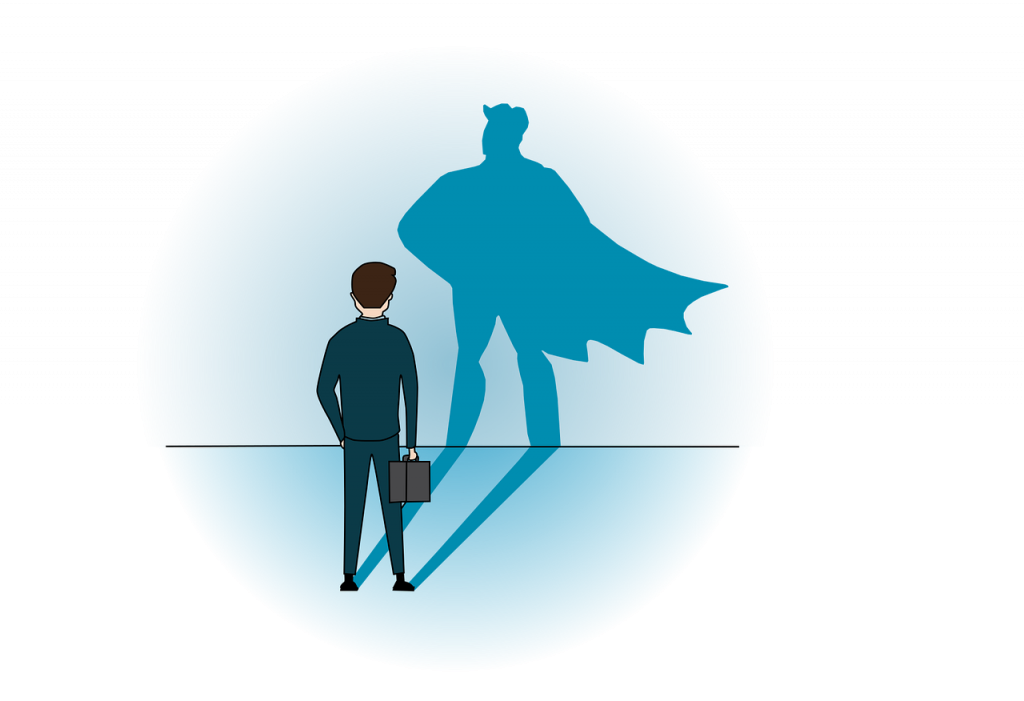
It was summertime in Birmingham, the patter of feet and chatter of shoppers could be heard down New Street as I sat in Victoria square, coffee in hand, reading a book. A book which once finished would contribute to the birth of Broadway Academy’s newest superhero… a super-curriculum known as ‘The Broadway Geographical Society’.
I first come across the idea of a super-curriculum when reading ‘Teaching like Nobody’s Watching’ by the geography education guru, Mark Enser. For those of you who have come across this term for the first time here, the super-curriculum is typically defined as: the activities which stretch your classroom curriculum further. These activities are more carefully planned than extra-curricular ones, which appear as more random opportunities for students. They seek to harness the intrigue students have for a subject curriculum and develop it through embedding them into the curriculum. Throughout this article I’ll be presenting a few powers of the super-curriculum, in an attempt to inspire you the next super hero of curriculum.
At Broadway Academy, the powers of the super-curriculum are placed under the guise of the Broadway Geographical Society (or BGS as it’s better known as). As a result, students feel greater ownership over the subject and feel they are part of something bigger than ‘just a subject at school’.
Power 1: Seeing into the future with careers
Growing up I had two careers in mind. Butcher or actor. They may sound like bizarre choices but for a working-class teenager I would either work in the family business (butcher) or join the thespians I loved so much from the television I watched. I had no idea that I could be an urban planner, environmental lawyer or ecological consultant and even if I did, I had no idea how to be one.
Careers education often falls to the work of a career’s advisor in a school however, when it comes to the careers in our subject, we are often the experts. Students get to see examples of jobs that relate to the subject content they are learning as part of the BGS and more importantly how to get there in a sequence of logical steps. Students are regularly encouraged and supported to undertake work experience to aid them in landing one of these positions in the future.
In the wake of a virtual world, work experience has become much more accessible, with many internships now possible from home. Over the last two years we’ve had several students undertake programmes ranging from the local solicitors to the global charity organisation WaterAid.
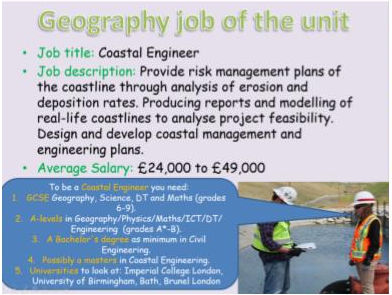
As well as sharing these job roles with students, we embed the practices of these jobs into lessons so students can get a real flavour of what the role involves and apply their geographical learning first-hand. Examples include; acting like a flood risk management consultant, where students use their knowledge of flood causes and management strategies to protect South Birmingham from flooding.
Students use satellite imagery, maps, and a budget to calculate the best option for the local council whilst working in a variety of roles throughout the exercise.
Connecting with local organisations and projects provides students with a real understanding of what jobs involve. In preparation for the Commonwealth games 2022 in Birmingham, students have worked with Arcadis to design and act as consultants on the building of a sustainable building project for the games. Not only does this make great links with outside agencies but allows students to see the purpose of geography, opening their minds to the jobs of their future.
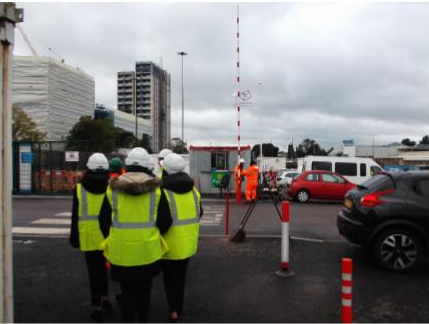
Power 2: You can fly with trips
Trips seem to have found themselves caked in red tape making teachers in schools apprehensive in running them. However, I would argue they can have a benefit that largely outweighs writing the laborious risk assessment. When carefully planned as part of a super-curriculum, they need not be expensive, far nor time-consuming.
Many teachers I talk to describe their students as living inside a local bubble but the extent to which pupils have explored that bubble through the lens of a subject I believe, is minimal. Through the BGS, students regularly practice geography fieldwork in the local area such as carrying out soil infiltration studies and tree carbon content. These short activities can require no bus, no lost time from curriculum and most importantly relate directly to their learning in the classroom, providing time for knowledge recall and application.
For those wishing to go a little further afield in their local area, try contacting your local wildlife trust reserve to carry out ecological fieldwork, walk the local streets and carry out a decibel survey using fieldwork apps or the local shopping centre to do land use surveys. The benefit of students understanding their local area through a subject discipline is that, even on the walk home from school they’re subconsciously understanding the world through geography and will be more enthused by it, when returning to the classroom.
For many inner-city geography teachers such as myself, the battle of getting students to understand long-shore drift occurring on our coastlines or the formation of glacial features is real. For young people it can be difficult to comprehend aspects of our subjects without seeing it for themselves and whilst I would love to take all of my students to a glacial valley, it’s not always feasible.
The advantage of being more culturally literate we know has implications for the future chances of our students and so I’ve sought to ensure they are given the best opportunities to develop it. With the likes of virtual reality software such as RoundMe and Google Earth, combined with GIS software such as ArcGIS and QGIS, reality can come to you. We use a variety of these programmes to give all students the opportunity for fieldwork in each unit studied as part of the BGS and are not hampered by access to these geographical environments.
We at Broadway are fortunate enough to have access to our own campsite grounds to get away from the Birmingham city life and into the countryside of Worcestershire. Here, we can offer our students the opportunity to carry out fieldwork in a range of environments including woodland, freshwater systems and agricultural grounds. As part of the BGS, students have started to contribute to long-term monitoring of the site using meteorological and ecological survey equipment in the hope of using the data to support virtual fieldwork in the classroom.
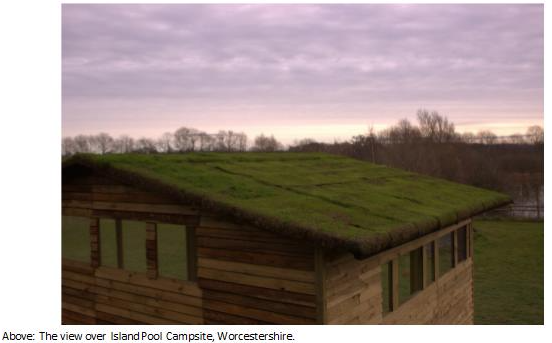
Where time and finance are available the benefits of taking students on residential trips away from their usual surroundings have become immense for students at Broadway in providing them with cultural capital. Most recently, we took year 13 students to Southwold on the Suffolk coast to collect data for their NEA. For me it was a chance to show students the reality of coastlines and support their learning of coastal systems in the classroom.
For my students it was the first time some had seen the swash of waves, the first time they’d been truly independent by collecting data in small groups and a golden chance to leave the city and smell the salty sea breeze. The experience had developed their cultural literacy of coastal regions and of British life outside of inner-city Birmingham. Upon returning, my students are happier, more confident, and more focussed on their studies. They see the purpose of geography in their lives and in the wider world. Surely that was worth the lengthy risk assessment?
Power 3: The magic of luck in competitions
When I ask students what they did at the weekend, I tend to get responses of ‘sleeping’, ‘gaming’ and the teens favourite ‘nothing’. Our students don’t always have the opportunity to go to galleries, go on weekend holiday breaks or go bowling every week. So why not spend time ‘enjoying’ our subjects through entering a competition.
We have developed as part of the BGS a competition for each unit taught across all year groups offering students the chance to engage with the fun in our curriculum. This can be building a volcano, completing a middle eastern maths quiz or cooking culturally diverse food. In the past, these activities would have been encouraged as homework, however, they offer little in solidifying the classroom learning. Whilst they may not be the most effective as homework, they certainly have a place as part of the super-curriculum in motivating our students to learn more about geography.
In the past, I have sat in meetings whereby subject leaders have been encouraged to match their curriculums and ensure certain topics are taught at the same time. While interdisciplinary links are crucial in ensuring students don’t see subjects in isolation of each other, curriculums are carefully planned to ensure there is development in a subject and so shouldn’t be altered so climate change impacts in geography is taught at the same time as science teaching the greenhouse effect.
However, our internal competitions are the perfect place for interdisciplinary links to made. We link up with design technology to judge the best approach to building a ‘bug hotel’ combined with the best environment it should reside in. We connect with English to support students writing refugee diary extracts whilst determining their understanding of cause and effect in migration.
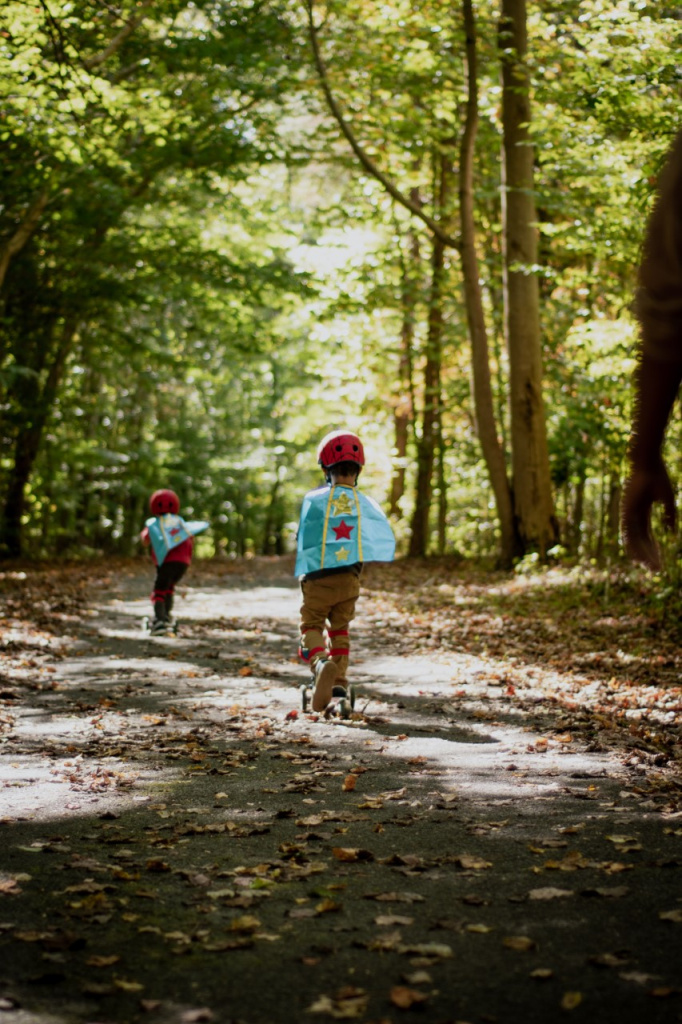
Beyond this, there are a multitude of national and international competitions for students to enter related to our subjects which we take advantage of. In the past, we’ve guided students to competitions in the RGS, Action for Conservation and the Birmingham Wildlife Trust. Competitions give young people the confidence in their ability to achieve and provide them with something worthwhile to do on their weekends rather than ‘nothing’.
Power 4: Super intelligence through lectures
When I first started teaching, one significant issue I glossed over as I left university was that geography had already moved on without my knowledge. It’s integral to our role as educators that we keep up to date with changes and advancements in our disciplines, and so should our students too.
In an effort to create great minds of the future, geography lectures are offered to students in all key stages to extend their knowledge of geography beyond the classroom. One benefit of the world becoming more acclimatized to using video conferencing software such as Zoom, is that we can access anywhere from the confines of our home or classroom. Over the last two years, we have hosted and attended lectures ranging from ecologists in the Atlantic rainforest of Paraguay, to an office at the University of Iceland, to a Q&A session live from COP26.
We use the phrase it’s ‘cool to be clever’ in the BGS and actively encourage students to challenge academics by posing questions to critically evaluate the world in which we live in. By creating an academic culture, students are more likely to achieve in geography and creating a ripple effect across other subjects. We’ve seen the benefit of this on the small scale and are now expanding our offer to include a calendar of lectures across the academic year. These contacts often come about by reaching out to friends and acquaintances made through my own academic study. Why not try your own, you’d be surprised how many people are willing to support young people.
Power 5: Mind reading or is it just reading?
‘Books are boring’, ‘I don’t like reading’ and ‘what’s the point in reading’ are the regular complaints I get from young people when asked to read. That was until, disciplinary reading entered the room.
Within the super-curriculum, there is a perfect opportunity to support students in reading while also encouraging them to stretch their knowledge of geography further. In the BGS, we have a stepped approach to creating young readers. Firstly, devising reading lists of fiction and non-fiction related to each unit studied across key stages acts as bait. Secondly, sharing ‘hot reads’ within that unit to garner their intrigue and thirdly, incorporating extracts from the book into lessons to hook them in. Then snap, they’re caught in the reading trap. To improve chances of getting students addicted to reading in geography, you can contact authors to host Q&As with your students or invite them into schools to carry out workshops.
Combined with reading, sharing watching (films/television) or listening (podcasts) lists with students in a similar approach is a good way to captivate interest in a subject. My students’ favourites include: Vox Explained series, the GA Geogpod and the Curious Geographer on YouTube.
Every year, our BGS super-curriculum develops new powers to invigorate and excite our young geographers further. It’s made our curriculum offer wider, deeper, and more challenging for staff and students. What could a super-curriculum do for you?
Jack Cockayne is the head of geography at Broadway School, Birmingham